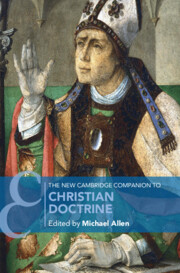Book contents
- The New Cambridge Companion to Christian Doctrine
- Cambridge Companions to Religion
- The New Cambridge Companion to Christian Doctrine
- Copyright page
- Contents
- Contributors
- Preface
- Part I Doctrines
- 1 The Triune God
- 2 Creation and Providence
- 3 Humanity
- 4 Israel
- 5 Christ
- 6 Atonement and Sin
- 7 Holy Spirit
- 8 Holy Scripture
- 9 Church and Sacraments
- 10 Eschatology
- Part II Movements
- Index
- Cambridge Companions to Religion (continued from page iii)
- References
8 - Holy Scripture
from Part I - Doctrines
Published online by Cambridge University Press: 03 November 2022
- The New Cambridge Companion to Christian Doctrine
- Cambridge Companions to Religion
- The New Cambridge Companion to Christian Doctrine
- Copyright page
- Contents
- Contributors
- Preface
- Part I Doctrines
- 1 The Triune God
- 2 Creation and Providence
- 3 Humanity
- 4 Israel
- 5 Christ
- 6 Atonement and Sin
- 7 Holy Spirit
- 8 Holy Scripture
- 9 Church and Sacraments
- 10 Eschatology
- Part II Movements
- Index
- Cambridge Companions to Religion (continued from page iii)
- References
Summary
To describe the Bible as “Holy Scripture” is to identify it as set apart by a holy God for the purpose of generating and governing a “holy nation,” a description applied first to Israel (Exod. 19:6) and later to the church (1 Pet. 2:9). The word of God and the people of God exist in a symbiotic relationship, though there is some dispute over which has priority: Does the word of God proceed from the people of God or vice versa? Either way, a doctrine of Scripture must have recourse to more than history or sociology, for its main task is to say how both the word of God (the Bible) and the people of God (the Church) are of God. The present essay reflects theologically on the nature, attributes, purpose, and interpretation of the Christian Bible, examining each of these aspects in relation to God and God’s acts. Viewed theologically, Scripture is a human constituent in the communicative activity of the triune God: the voice, word, and breath that speaks forth the light, life, and love of God himself.
- Type
- Chapter
- Information
- The New Cambridge Companion to Christian Doctrine , pp. 119 - 138Publisher: Cambridge University PressPrint publication year: 2022

